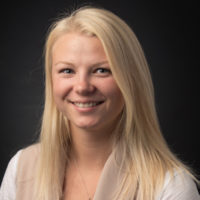 Vera Schulte’s twin passions, advocacy and medicine, are closely intertwined and evolved simultaneously, but she hadn’t planned on becoming a physician. “I grew up wanting to be a physicist,” she says. “I’ve always enjoyed math and science.”
Vera Schulte’s twin passions, advocacy and medicine, are closely intertwined and evolved simultaneously, but she hadn’t planned on becoming a physician. “I grew up wanting to be a physicist,” she says. “I’ve always enjoyed math and science.”
Born in Germany, Schulte immigrated to the U.S. at age 4 when her father took a job with Microsoft. “I was raised with one foot straddling each side of the Atlantic,” says Schulte.
While pursuing her undergrad degree at Washington University in St. Louis, Schulte lived in the Delmar Divide neighborhood — an area known as the socioeconomic and racial dividing line in the city. She discovered the area had high teen pregnancy and maternal morbidity rates.
“It was my first exposure to such a disparity between healthcare access and outcomes,” she recalls. Wanting to learn more about why the area had such poor access to care, Schulte started the university’s first Women’s Health Group. Her goal was twofold: to get more students involved in the community and to lobby on behalf of women at the state capitol.
“That’s when my interest in advocacy and medicine was born,” says Schulte. “I realized how important it was to advocate for patients who couldn’t advocate for themselves because of income disparity, immigration status or racial or ethnic issues.”
Instead of applying for PhD programs during her senior year, she applied to medical schools. Though she was accepted by several, the UW School of Medicine was her first choice. In addition to being closer to family, the WWAMI (Washington, Wyoming, Alaska, Montana, Idaho) regional medical education program attracted her.
“It’s such a unique program,” she explains. “I had clerkships in Wenatchee, Washington; Coeur d’Alene, Idaho; and Bozeman, Montana.”
Her time on the Spokane campus proved transformative. “My 18 months in Spokane was more than I ever thought it could be,” Schulte says. “The faculty is incredibly supportive academically, but also helps you realize your aspirations outside the classroom.”
For Schulte, that meant becoming a student liaison for the American Medical Association, as well as serving as the chair of the Medical Student Section of the Washington State Medical Association (WSMA).
In September, her fervency, work and dedication were recognized by the WSMA when Schulte received the Early Career Member of the Year Award.
Schulte’s mentor, Clint Hauxwell, MD, co-director, Foundations of Clinical Medicine, UW School of Medicine Spokane, was delighted to see her honored. “She’s an example of the type of outstanding students we attract in Spokane,” he says. “We give them opportunities to grow and thrive in their unique interests, as well as in their medical education.”
Hauxwell, a member of the WSMA board, said the organization is invested and committed to promoting student involvement. He saw firsthand Schulte’s passion for advocacy and medicine. “Vera’s skills in the hospital are excellent,” he says. “She’s empathetic and thoughtful in her patient interviews. She excels both academically and clinically.”
Part of Schulte’s involvement with the WSMA included attending the annual meeting of the House of Delegates, where resolutions are submitted and voted on by members. “When resolutions are passed, they become policy and can be added to the WSMA’s legislative agenda,” explains Hauxwell.
Schulte saw how welcome and supported medical students were in the organization, and she wanted to encourage more student involvement. “I created a coalition of medical students from schools across the state,” she says. “We hosted a resolution writing workshop and had a good turn out.”
The Medical Student Section ultimately submitted a record number of 10 resolutions in 2019. Nine were accepted, and six of those were authored by Schulte. She was thrilled when the WSMA used two of those resolutions to advocate before the legislature. Bills regarding evidence-based sex education and healthcare reform in the criminal justice system were passed into law this year.
“It was amazing to see a bill sponsored and passed into law because of a resolution I wrote,” she says.
Schulte was also honored by the UW School of Medicine, in Spokane. “We gave Vera the Academic Citizenship Award for her class,” says William Sayres Jr., MD, foundations assistant dean and the Smith Family Endowed Chair of Medicine at the UW School of Medicine. “Vera was engaged and worked with faculty and fellow students to make the education experience exemplary.”
Schulte had stayed in Spokane to do her summer research project and offered valuable feedback, which Sayres used to improve the classroom experience. “The success of our program relies on students working closely with faculty,” Sayres says. “Vera is a great example of that.”
In October, Schulte stepped down as chair of the Medical Student Section of the WSMA. She’s currently in the midst of residency applications. “I chose to go into obstetrics and gynecology,” she says. “A lot of the programs I’ve looked at have advocacy integrated into the curriculum. I’m hopeful that I can continue in advocacy, not just during residency, but throughout my career.”
Hauxwell has no doubt she will succeed in her aspirations. “Vera is a mover and a shaker behind the scenes,” he says. “She gets things done.”

